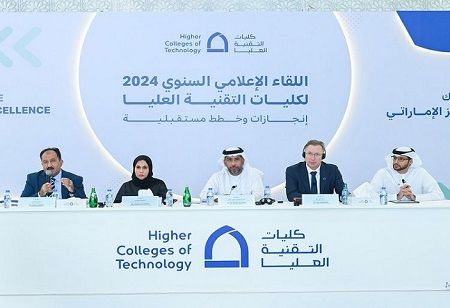The Higher Colleges of Technology (HCT), a federal higher educational institution in the UAE with 16 campuses nationwide, has introduced several initiatives aimed at enhancing career readiness. These include sending professors on sabbatical leave for field training and offering apprenticeships and vocational certification courses to prepare Emirati students for future employment opportunities. Dr Faisal Alayyan, HCT president and CEO, announced these details at a press conference held to celebrate the first anniversary of HCT’s transformative education model.
“HCT launched our new educational model in 2023 to answer the new demand of the job market. We also announced plans to offer three study tracks for students, where the vocational diploma programme was added to the applied bachelor’s programme, which created new opportunities for hundreds of students according to their abilities and interests. Today, HCT is preparing to add the third track - professional certificates”, said Dr Alayyan.
Aligned with career acceleration, the one-year certificate courses are anticipated to expand students' opportunities in alignment with industry demands. Sumaya Abdulaziz Al Hosani, Vice President for Strategy and Future at HCT, informed Gulf News that vocational certification programs will be accessible to high school students who haven't met criteria for alternative pathways, facilitating rapid entry into the workforce.
Speaking to Gulf News later, Dr Alayyan said the Apprenticeship Programme will be expanded by tying up with leading companies. “Students spend a minimum of six months in companies for the apprenticeship. They need to be treated and evaluated like employees by both the companies and the university so that they are well-prepared for the job market when they go for an interview or get hired by the same company where they did the apprenticeship”.
In the past year, approximately 6,180 students participated in apprenticeships across nearly 30 disciplines within bachelor's and diploma programs. Dr. Luc Verburgh, Chief Academic Officer at HCT, emphasized that faculty now must possess both academic credentials and practical expertise. He highlighted the need for highly qualified educators with distinguished international backgrounds in applied education to support the introduction of new academic pathways.
Dr. Verburgh mentioned that in the last academic year, HCT onboarded 75 new academic staff members, and this year, they have recruited more than 110 additional faculty members to manage the expanded programs. HCT has introduced the Outbound Industry Sabbatical Leave initiative to advance the professional growth of its academic staff, ensuring they stay abreast of evolving job market requirements.
Dr. Verburgh explained that the initiative provides faculty members with the opportunity to participate in a sabbatical period lasting from two weeks to one month annually, allowing them to immerse themselves in workplace settings. This experience enables them to acquire firsthand knowledge of the latest practices, applications, and practical methodologies pertinent to their respective fields.
“This opportunity allows faculty members to engage in hands-on experimentation with cutting-edge technologies and market experiences. They can then leverage these insights to enhance their teaching methodologies and impart practical knowledge to their students, thereby fostering the development of applied skills”, Dr Verburgh said.

